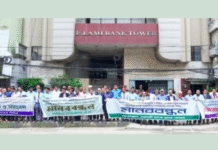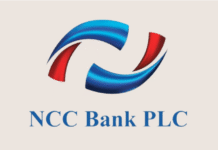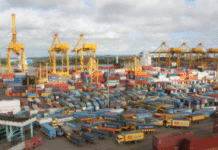Dhaka, Dec 3 (bdnews24.com)—The International Monetary Fund (IMF) has agreed to release the second tranche of the $1 billion in extended credit facility (ECF) to Bangladesh after long haggling.
After meeting an IMF delegation on Monday, Finance Minister Abul Maal Abdul Muhith told reporters that Bangladesh will receive the second instalment worth $141 million in January.
“We are on talk, we will get it in January (next year),” he said.
After a year-long negotiation, the IMF Executive Board had approved the three-year ECF of SDR 639.96 million (about $987 million) to Bangladesh in Apr 12 this year setting conditions to reform four sectors. The total credit was supposed to be disbursed in six instalments in three years.
Bangladesh received the first instalment of $141 million at the end of the April.
The second instalment was supposed to be made available in October. But the IMF had been holding it back saying their conditions were not fulfilled by Bangladesh government.
An IMF team had also visited Dhaka at the end of October to discuss the terms of disbursement of the second instalment.
But the instalment was not released in October even after the team returned to Washington on meeting top government officials including the Finance Minister and the Governor of Bangladesh Bank.
Another IMF team also came to Dhaka on Nov 28 and held meeting with the Minister, Governor and the top government officials on Monday evening.
Bangladesh has been negotiating with the IMF for over a year to get the loan under the ECF arrangement to cope with the balance of payments problem.
The IMF in a media statement on Apr 12 on the ECF approval had said, “Other donors will now show positive attitude towards Bangladesh after IMF’s credit approval. As a result, it will have a positive impact on foreign investment. Using the loan, the balance of payment problem can be handled, which would advance Bangladesh in international credit rating, and promote country’s image in the international arena.”
“Bangladesh will undertake reform programmes in four major areas to ensure macroeconomic stability, external viability, and sustained growth.”
The government has been hiking the prices of power and fuel oil in the last one year prescribed by it, but the IMF was far from happy over the pace of such action.
The IMF in the statement had said, “Prolonged delays in adjusting fuel, electricity, and fertilizer prices and unanticipated increases in import-related costs could exert additional pressure on the fiscal and external positions.”
It had said, “Bangladesh is committed to taking actions to create fiscal space, reinvigorate the financial sector, and catalyse additional resources, in order to boost social- and development-related spending, tackle power shortages and the infrastructure deficit, and stimulate export-oriented investment and job growth.
“Bangladesh will undertake reform programmes in four major areas to ensure macroeconomic stability, external viability, and sustained growth.
The reform areas were – fiscal policy, monetary and exchange rate policy, financial sector, and trade and investment.
Bangladesh, according to the IMF, has been facing macroeconomic pressures over the past 18 months when balance of payments went into a deficit in the last fiscal and reserves declined significantly owing mainly to increased demand for oil imports.
“Fiscal strains have emerged due to rising subsidy costs, mainly on account of higher fuel consumption while headline inflation, while moderating recently, remains at an elevated level, with nonfood inflation the main driver,” the IMF had also said in the statement.
Source: Bdnews24










